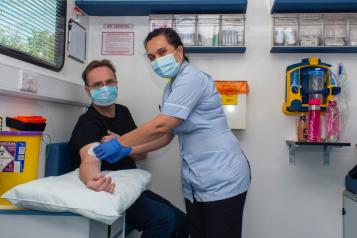Statement on COVID-19 vaccination of people working/deployed in care homes

The Department of Health and Social Care (DHSC) have amended the Health and Social Care Act 2008 (Regulated Activities) Regulations 2014 so that, from 11 November 2021, all care home workers and other visiting professionals will need to be fully vaccinated against COVID-19, unless they have an exemption or there is an emergency.
The Care Quality Commission (CQC) have published a statement which outlines their approach to registration, ongoing monitoring and inspection, and enforcement.
Webinar
The Department of Health and Social Care will be holding a webinar for care home managers and providers, to provide information and answer questions on the requirement for anyone working or deployed in a care home to be fully vaccinated against COVID-19 from 11th November 2021.
The webinar takes place on Tuesday 17 August 2021 at 12:30 - 13:30 BST
Statement on COVID-19 vaccination of people working / deployed in care homes: the role of the Care Quality Commission
The Department of Health and Social Care (DHSC) have amended the Health and Social Care Act 2008 (Regulated Activities) Regulations 2014 so that, from 11 November 2021, all care home workers and other visiting professionals will need to be fully vaccinated against COVID-19, unless they have an exemption or there is an emergency.
Registered persons (registered managers, registered providers) will need to ensure that they do not allow anyone entry into a care home unless they have had a complete course of an authorised vaccine or fall into one of the groups exempt from being vaccinated.
Detailed information about how you can prepare for and meet this change in the Regulations can be found in the DHSC operational guidance. We urge all relevant providers, managers and staff to read the guidance and take any necessary actions in order to be ready for when this duty is in place.
The requirement forms part of the fundamental standards and will be monitored and enforced in appropriate cases by CQC. We will not begin monitoring this until it becomes a duty in November. We will continue to use our existing assessment and enforcement policies and take a proportionate approach.
This statement outlines our approach to a) registration, b) ongoing monitoring and inspection, and c) enforcement.
Registration
CQC will seek assurance from new providers, and from existing providers varying their conditions of registration, that they will have a robust governance process to:
- monitor vaccination and COVID-19 status of staff
- ensure staff maintain an up to date vaccination status (by providing guidance and assistance for staff to get vaccinated) and ensure staff maintain up to date best IPC practice
- monitor vaccination and COVID-19 status of personnel entering the care home, and
- where applicable, make reasonable adjustments to ensure people using the service receive safe care and treatment.
For new manager applications CQC will seek assurance that:
- applicants are fully vaccinated or exempt
- applicants are aware of their duties in relation to the new Regulations regarding COVID-19 vaccination.
Ongoing monitoring and inspection
- Monitoring that providers comply with the Regulations is CQC’s responsibility.
- We propose to add the following question to the Provider Information Return (PIR) once this duty is in place: ‘How are you assured that those you employ and deploy within your service have had their mandatory vaccinations?’
- We will also build a similar question into our monitoring approach once this duty is in place. Further information will be provided in due course.
- Where we have information of concern, through any route, we will follow this up. This may include seeking assurance from the provider or carrying out an on-site inspection.
- On inspection, where the information we hold identifies concerns, we will look for evidence to confirm systems and processes are in place to comply with the requirement.
- Registered persons will not be required to show a record of the evidence itself to inspectors but will need to be able to provide reassurance that systems and processes are in place to ensure individuals who enter the premises are fully vaccinated. Registered persons may choose to make a record of the evidence they have seen for their own internal staff employment record keeping. If the evidence is collected and recorded, all personal data must be handled in accordance with UK GDPR. This includes providing individuals with privacy information at the stage their data is being collected. Please refer to the guidance from the Information Commissioner’s Office to ensure you have the appropriate lawful basis, technical and security measures in place to protect personal data.
- Registered persons (or those acting on behalf of the registered person) must check that anyone wishing to enter the premises has received a full course of vaccination, unless they are exempt. CQC inspectors are included within the scope of visiting professionals for the purpose of this Regulation and we are considering the practical implications of this for our staff in exercising their regulatory activity. Compliance with the Regulations would be an appropriate reason for not granting access to a CQC inspector, or another individual, unless they are exempt.
Enforcement
- Any enforcement activity which is generated as a result of a breach of the amended Regulations will be undertaken on a proportionate basis, based on our assessment of the impact on quality of care and people’s safety, in line with our existing enforcement policy. We will decide whether/what action to take based on proportionality, treating each case individually and on its’ own merits, in line with our enforcement policy.
For full information on the scope of the Regulations, how to collect and record evidence of vaccination or exemption, and for useful sources of support and information, please refer to the DHSC operational guidance.


